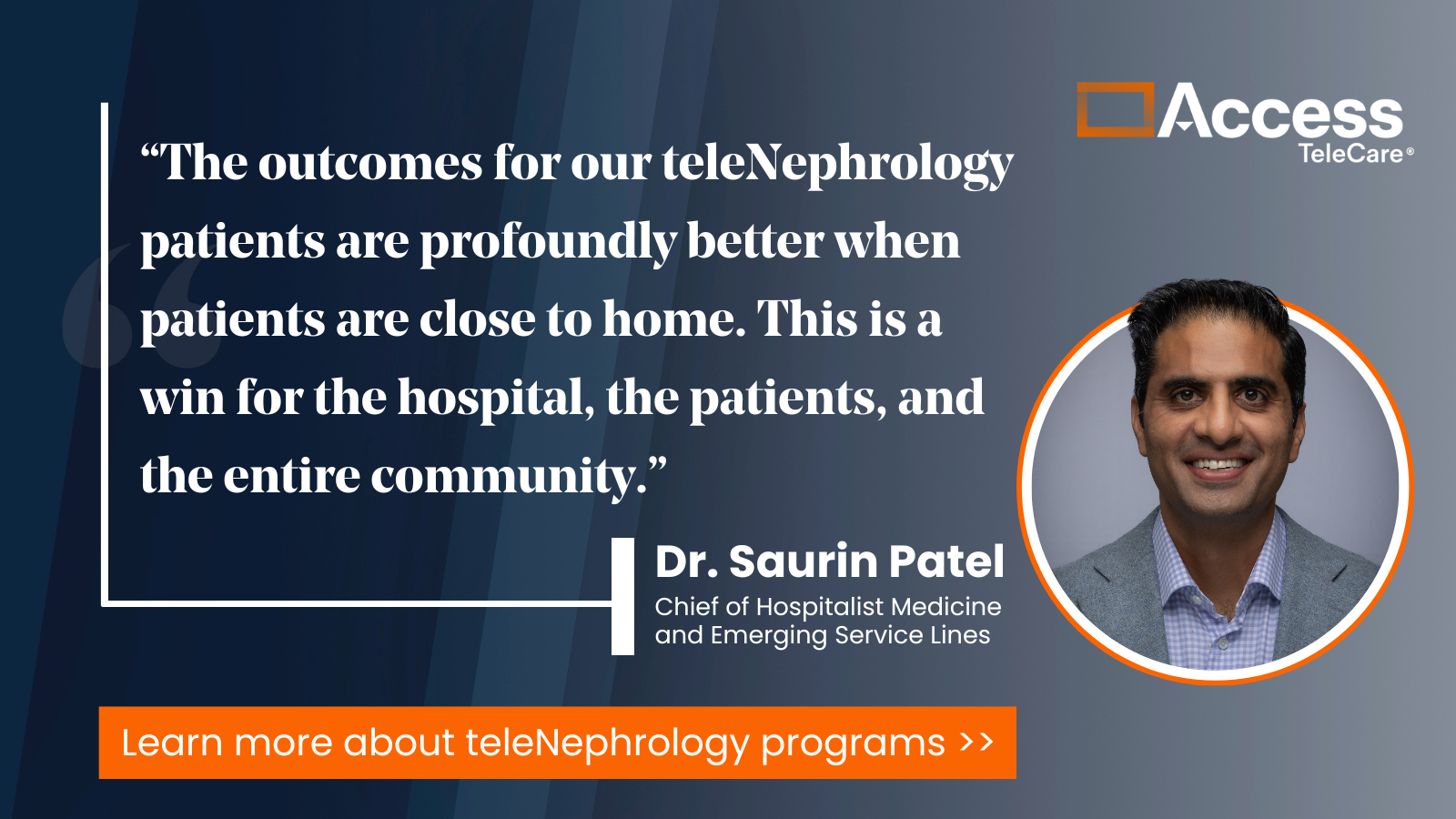Last year patients in Vermont waited the longest to see nephrologists, of all the specialties, with a median wait time of 100 days.
This data came from a 2022 survey and report from multiple Vermont state agencies. It also found long wait times for endocrinology and rheumatology. When appointments are hard to come by, patients start shopping around for whoever can see them fastest. This represents a huge risk for health systems—or an opportunity.
“Hospitals want patient satisfaction and quality patient care,” said Dr. Paulgun Sulur, vice president of medical services and hospitalist service line chief for Access TeleCare. “But they also don’t want to lose patients.”
As telemedicine bridges gaps between supply and need and enhances access to care both in and out of hospital settings, hospitals and health systems can look to telemedicine to ameliorate the long wait times for nephrology, endocrinology, and rheumatology.
“You don’t want your patient to have to go far away just to see a rheumatologist,” said Dr. Sulur. “And what if that rheumatologist refers the patient somewhere else outside the system? That patient is now lost to that other system.”
Telemedicine can help health systems keep patients close to home, reduce travel costs, and dramatically improve patients’ quality of life. Access TeleCare has recently expanded its service lines to include nephrology, endocrinology, and rheumatology, recognizing that our hospital system partners need help meeting patient needs.
Quantifying Wait Times and Losing Patients
Access to specialty care varies dramatically from state to state, from rural to urban areas, and even within cities, but the Vermont data illustrates exactly how telemedicine can be so powerful.
For example, wait times were higher for specialists in the state compared with those out of the state, indicating that many patients are traveling to a neighboring state just to get a quicker appointment.
The report also tracked wait times across different health systems with wildly different results from system to system. Patients of a health system with the longest wait times averaged 87 days to get an appointment with a specialist—but on the other end of the spectrum, the fastest systems got patients an appointment in only 21 days.
How Telemedicine Helps
Access TeleCare is expanding its teleNephrology, teleEndocrinology, and teleRheumatology programs to help our hospital partners reduce those wait times and provide a wider scope of inpatient specialty care.
Opportunities for teleNephrology:
- Consultations: With teleNephrology consultations, hospitals that lack an on-site nephrologist or have limited availability can get help diagnosing and managing acute kidney injuries, electrolyte imbalances, or other kidney-related issues that arise during a patient’s hospital stay.
- Acute dialysis management: Telemedicine can be used to remotely monitor and support patients who require acute dialysis treatment during their hospital stay. TeleNephrologists can collaborate with the bedside care team to make real-time decisions on dialysis prescriptions and provide guidance on managing dialysis-related complications.
- Multidisciplinary care coordination: TeleNephrologists can facilitate collaboration and communication among other specialists involved in the care of patients with complex medical conditions, such as those with advanced kidney disease. This can help ensure coordinated and comprehensive care for patients.
- Patient and family education: Specialists can provide patient and family education about kidney disease, its management, and any required treatments, such as dialysis or transplantation. This can help patients and their families better understand their condition and be more engaged in their care.
- Transition of care: Telemedicine can play a role in the transition of care for patients with kidney disease who are being discharged from the hospital.
The Outpatient Setting: TeleEndocrinology and TeleRheumatology
For endocrinology and rheumatology, many of the telemedicine opportunities are for outpatient clinics, especially in areas where appointments are hard to find.
TeleEndocrinology can facilitate the remote management of diabetes, thyroid disorders, osteoporosis, and other common endocrine disorders, allowing for medication adjustments and reducing the risk of complications.
For patients with rheumatology conditions, having a teleRheumatologist can help clinics monitor and manage chronic inflammatory diseases, evaluate complex patients, and consult with patients on pain management strategies. A teleRheumatologist can help ensure these patients receive appropriate care and management for their specific conditions.
How Telemedicine Impacts Patients
“There were tears shed,” said Dr. Sulur, recalling when his wife, an endocrinologist, moved on from providing teleEndocrinology care for patients in rural Texas. She had helped those patients with complex and chronic conditions avoid hours-long drives to Dallas to get care. And, she had developed close relationships with patients and their families, and they were sorry to see her go. “She had made such a difference for patients having to drive, and all that cost, the impact to their work, to child care. There were a lot of ripple effects.”
As the pioneer in complex, high-acuity telespecialty care, Access TeleCare is building on its decade of success and expanding its programs to include more specialty services so that more patients can get the care they need locally.
Contact us today for more information about our service lines.









